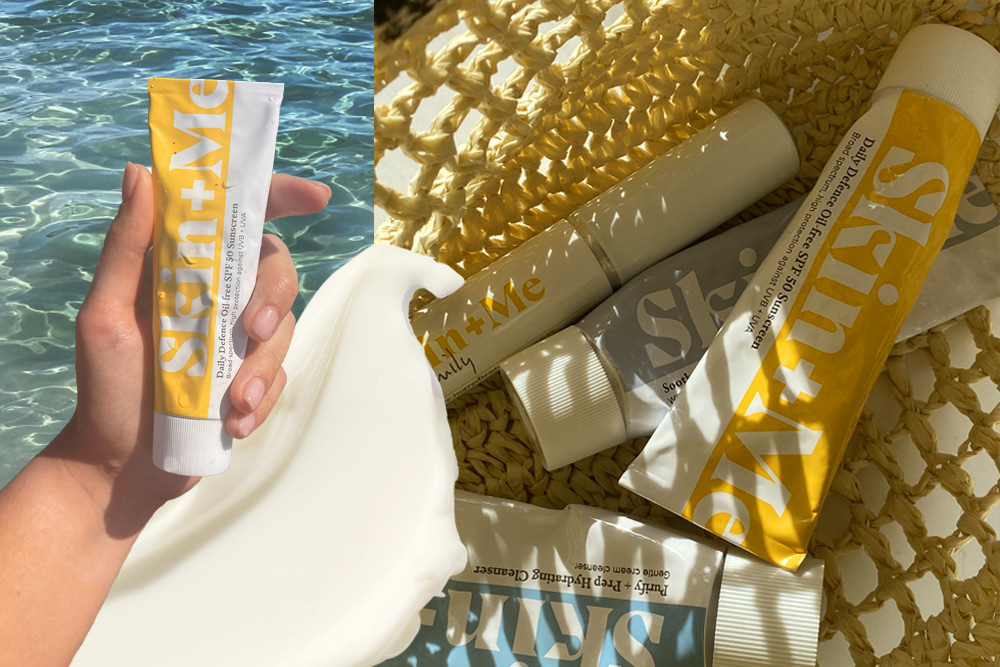Ask A Dermatologist: Why Are Sunscreen Filters So Important?

Hormones and Your Skin: PCOS, Menstruation and Menopause
Our bodies go through a lot in our lifetimes, and our hormones play a big part in that. Menstruation and menopause, or the introduction of Hormone Replacement Therapy (HRT) to polycysitic-ovarian syndrome (PCOS), your skin can flare-up during big hormonal shifts.
With hormones fluctuating throughout our lives we need to get used to change. But that doesn’t mean that we can’t find a way to help our skin look and feel its best. Let’s dive in on how your skin can be affected by hormones, and what you can do about it.
What are hormones?
Hormones are chemical messengers that are needed for a number of important processes in our body such as growth, metabolism, sexual function and reproduction.
Hormones also play a key role in skin health and when there’s an imbalance in hormone levels, it can manifest in our skin. Hormone imbalances can be caused by life stages such as puberty, pregnancy or menopause. Some medications, contraception or medical conditions can also lead to hormonal fluctuations.
Hormones and acne
Sex hormones, particularly androgen, play an important role in the development of acne. Androgens are produced at a higher level in men, and excess androgens can also be present at smaller quantities in women. They stimulate the oil-producing gland that can lead to the development of acne.
Contraception and acne
Hormonal contraceptives contain either one or a combination of synthetic hormones that mimic oestrogen and progesterone.
We all produce oestrogen, although women produce more than men in their ovaries and it regulates their menstrual cycle. Progesterone is another type of female hormone that helps prepare and maintain the body for pregnancy. On a case-by-case basis, progesterone can both worsen or improve acne.
Oestrogen and progesterone can suppress the production of androgen. That’s how hormonal contraceptives can help in treating hormonal skin breakouts.
This is all dependent on the particular hormonal contraceptive and what type of progesterone it contains. If you suffer from hormonal breakouts it’s useful to know (and discuss with your dermatologist) what type of contraceptive you’re using.
Menstruation and your skin
Cyclical hormone changes in our skin happen regularly when we menstruate. Most period cycles last for 28 days, and in this time, your skin is constantly being bombarded by hormone changes.
Whether it’s breakouts that always flare up at the same time, or your skin looking clearer the week after your period – all these fluctuations have an effect.
It works like this: Your hormones shift on the first day of your period and oestrogen levels increase until they become higher than progesterone levels.
Roughly halfway through your cycle, your progesterone levels rise so that they outweigh your oestrogen levels which has a direct impact on your skin’s sebum production. This can make skin more oily. Cue those pesky spots and acne turning up uninvited.
PCOS and your skin
Polycystic ovarian syndrome (PCOS) is a common hormonal disorder in women of reproductive age, affecting up to 20%. Women with PCOS may have irregular periods, excess or unwanted hair growth (hirsutism), thinning or hair loss from scalp, weight gain and oily skin and acne.
Does PCOS cause acne?
Yes, PCOS can aggravate acne. The increased production of androgens will have a direct effect on the oil glands (sebaceous glands) that can lead to the development of acne.
While there’s no cure for PCOS, the symptoms can be treated. Oral medications can help with insulin resistance and hormone irregularities, but it may be worth discussing this with your GP, particularly if it’s affecting your everyday life or mental wellbeing.
If you’re struggling with acne as a result of PCOS, a topical treatment can help – if you’re using Skin + Me and thinking about combining it with an oral acne treatment such as spironolactone, please email us to get in touch with your Prescriber, and let your GP know.
PCOS can have a lasting impact on how you feel about your skin and your body, but remember to show yourself some compassion. There’s ways through this, with the right expert support and a reminder that you’re not alone.
Motivational speaker, model and activist Harnaam Kaur, who lives with PCOS and embraces her symptoms, reminds us: “We need to realise that everyone is different. We are all imperfectly perfect. Beauty just isn’t about looking a certain way.”
Menopause and your skin
Menopause is when you stop having periods and the function of your ovaries declines. It’s a natural part of ageing that typically starts from your mid-40s onwards. With age comes wisdom, and it’s worth being wise to the effects of menopause.
It’s not just your period that’s affected, menopause also plays a big role in skin-ageing because our oestrogen levels dramatically drop during this time. Oestrogen receptors – found on the skin – play a role in many of your skin’s restorative processes.
From collagen levels to hydration, as well as healing. The loss of oestrogen can result in skin dryness, an increase in skin thinning, impaired wound healing, and a decrease in skin elasticity.
What’s more, your androgen levels rise during menopause. This has a direct link to higher levels of acne as elevated sebum completely changes your skin’s cell activity. Inflammation can regularly occur which leads to more breakouts, acne, and blocked pores.
Dr Ben Esdaile, Consultant Dermatologist, explains: “In post-menopausal women, as your oestrogen levels fall, your relative androgen levels are a bit higher, so that’s why you get a bit more of a breakout.”
As you enter menopause, your body produces lower levels of oestrogen hormones. This can impact your daily mood and the well-being of your skin. Other symptoms can include weight gain, hot flushes and difficulty sleeping.
HRT (hormone replacement therapy) is a common treatment for these symptoms because it replaces the hormones that your body can’t naturally produce anymore. It makes these symptoms less severe and can improve your quality of life post-menopause.
HRT and your skin
While the hormonal shifts we associate with periods settle post-menopause, the temporary fluctuation of hormones caused by HRT can trigger breakouts by giving you oiler and more acne-prone skin.
Most of the time though, HRT helps restore your normal skin functions. The dominant hormone responsible for acne is testosterone, and the oestrogen hormones used in HRT can help to reduce your production of testosterone.
Once your hormones settle, you should be less likely to get acne or hormonal breakouts after you start using HRT. Plus, HRT doesn’t just act as a preventative measure against acne, it can also improve skin functions such as hydration and sebum secretion and better-regulated sweat production.
It’s important to be aware of how much skin can change alongside our hormones, whether that’s through menstruation, menopause or by using HRT. Seeing a medical professional can help pinpoint the causes behind changes, how to treat them and ultimately have a better relationship with your changing body and your skin.
By understanding our flux in hormones, we can learn to love the skin we’re in.
Medical facts checked by the Skin + Me Dermatology Team
New to Skin + Me? Get your first month of personalised skincare for £4.99 with promo code DOSE – complete our quick consultation here.
Looking for a routine refresh? Add the Dream Routine to your Skin + Me subscription.
In need of a restock? Head to The Skincare Shop for one-off purchases of your Routine Essentials.



